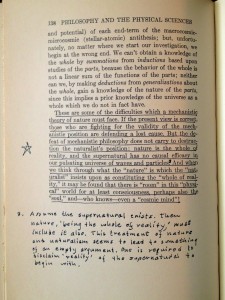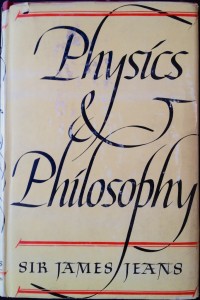In our latest installment of how a historian of science read his books, we travel back to his formative years when he was still an undergraduate studying electrical engineering (previous adventures have come from his postgraduate days). Even then he was an active reader, underlining, annotating, criticizing, praising, and putting authors in dialog with each other.
In 1950 he purchased a copy of O. L. Reiser’s Philosophy and the Concepts of Modern Science (New York, 1935). Two chapters in this book received most of his attention, “Vision and Reality” and “Naturalism and the New Physicis.” Although some of his comments appear neutral, merely noting a passage, the pattern suggests a real concern with materialism and determinism.

The following caught his attention:
It is not at all clear just what the positive outlines of the new philosophy of nature will be, but of one thing we are certain: another fossil of human intellectual evolution, the naïve materialism which modern physical science inherited from classical Greek atomism, will soon take its place in the cultural museum of deceased scientific doctrines.
He added in the margin simply, “decline of materialism.” Throughout the chapter he returns again and again to the relationship between the perceiving subject and sense data, especially vision. Across the bottom of one page he asserts: “1. Hence our ability to ‘conceive’ is limited by our ability to ‘perceive’!”
He seems discontent with the summary at the end of “Naturalism and the New Physics” where Reiser concludes “nature is the whole of reality, and the supernatural has no causal efficacy in our pulsating universe of waves and particles.”

He added across the bottom:
Assume the supernatural exists, then nature, ‘being the whole of reality,’ must include it also. This treatment of nature and naturalism seems to lead to something of an empty argument. One is required to disclaim ‘reality’ of the supernatural to begin with.
We also find evidence of his having read this book in light of other books in his growing collection of history and philosophy of science texts. Reiser’s book was numbered HPS-55. The previous year he had added J. Jeans’s Physics & Philosophy (Cambridge, 1943) to his collection—it is numbered HPS-7 and signed 1949.

He had read Jeans’s book with pen in hand, annotating pages throughout and collecting the most important arguments for later use. When reading Reiser’s Philosophy and the Concepts of Modern Science, he added to one page, “in fact, Jeans mentions matter being ‘correlations’ in space-time.” This issue of the nature of matter was just one of the themes that consumed much of his effort when he read Jeans’s Physics & Philosophy. The problem of freewill was another.

In an interesting spectrum of marginal notes, he moves from critique to unreserved agreement. His skepticism at the top of the page—
Interesting mis-statement of the question
.
.
.
and
.
.
.
its refutation
—by the bottom becomes unreserved agreement in “Amen!”
He adds across the bottom a note keyed to the passage at the top:
† Indeed, no small amount of this ‘unconscious’ ‘determinism’ is confuzed [sic] with
determinismfree-will.
It would be interesting to know in what context he was reading these books. It seems unlikely that they were assigned reading—I’m trying to imagine the engineering and science classes that would have included these texts on the syllabus. Was there a group of like-minded undergraduates who formed a sort of reading group? Was he encouraged by a faculty member? And why was he reading so carefully? Maybe by the time I finish looking through the 35+ boxes of books I’ll be able to hazard a guess. Until then, I will amuse myself on Friday afternoons by picking up his trail and following his footsteps through his books.
One reply on “Traces of Reading left by a Historian of Science”
[…] his place at the university, our historian of science continued consuming books as he had as an undergraduate. In the summer of ’73 he took with him on vacation his copy of C. Truesdell’s The […]